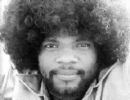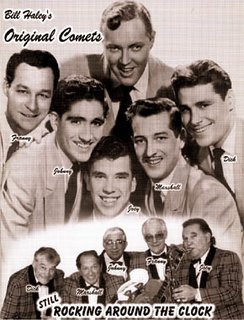Two Great Pianists Pass Away
This past week, the rock world lost two amazing and influential pianists, Billy Preston and Johnny Grande. Preston was perhaps the more renowned of the pair and for good reason--sometimes referred to as the "fifth Beatle" for his contributions to the Liverpudian lads' music, Preston played with so many artists of note that his credit list reads like a who's who of rock and roll. His soulful organ work can be found on tracks by Sam Cooke, The Beatles, Quincy Jones, The Rolling S tones, Aretha Franklin, John Lennon, Stephen Stills, Peter Frampton, Martha Reeves, Bob Dylan, Eric Clapton, Joe Cocker, even the Monkees.
tones, Aretha Franklin, John Lennon, Stephen Stills, Peter Frampton, Martha Reeves, Bob Dylan, Eric Clapton, Joe Cocker, even the Monkees.
Preston started playing piano early in his life; at ten he was performing gospel shows and by 15 he was touring Europe as a member of Little Richard's band. It was then that he first met the Beatles, a relationship that would culminate with Preston's appearance on the White Album and Let It Be. While Preston was known for his out-sized personality, he wasn't able to keep the Beatles from imploding. After they broke up, he played with Ringo, George, and John on their respective solo albums.
Preston also had a hand in on some of the great albums by another English band, the Rolling Stones. Preston played on Sticky Fingers and Exile on Main Street, and in my mind will always be remembered for his grand organ entrance on "I Got The Blues."
In addition to his work with other artists, Preston also had a fairly successful career of his own and co-wrote "You Are So Beautiful" with Joe Cocker (although it must be noted that Dennis Wilson claims to have co-written the song with Preston; Wilson made the song a regular at Beach Boy concerts as a protest for not being given a writing credit.) Preston was active musically right up until his sickness overtook him, playing on albums by contemporary artists such as Jet and Macy Gray.
While Johnny Grande can't match Preston in the sheer volume of material category, Grande gets bonus points in the innovator category. Well before Elvis, Chuck Berry, or Buddy Holly, Bill Haley paved the rock and roll way, with Johnny Grande at his side the whole time. The two of them originally played in an outfit called the Four Aces of Western Swing, but they changed their name to more user friendly Saddlemen before releasing a cover of "Rocket 88" (considered by some to be the first 'rock' song). Although the record didn't do well on the charts--the Saddlemen's version was neither r&b enough for black audiences or country enough for white audiences--the release was a seminal event in rock history. For better or worse, it was the first white band cover of the first rock and roll song.
As Grande and Haley continued to play, their sound wavered between r&b and country. However, the band seemed to hit on something with the single "Rock This Joint," a number that some credit as having inspired Alan Freed to coin the term "rock and roll."
While many historians dispute the who's and what's of the invention of rock and roll, none can dispute that Bill Haley's "Rock Around the Clock," had a major impact on music history. By now, the Saddlemen name had been discarded and the band took to calling themselves Bill Haley and the Comets. Johnny Grande was an integral piece of the band; he, along with remaining Four Ace Billy Williamson, were formal 'partners' in the band, sharing in royalties and song writing credits, while the remaining members were paid employees.
"Rock Around the Clock" was a major hit, selling a million records and reaching number seven on the charts in 1954--before Elvis had a hit, or Buddy Holly even had a record contract. Unfortuanately fo r Grande and Haley, their reign was short-lived; by 1956 Elvis was a star and Haley couldn't compete with the raw sexuality and marketability of the King.
r Grande and Haley, their reign was short-lived; by 1956 Elvis was a star and Haley couldn't compete with the raw sexuality and marketability of the King.
In all, Grande lent his boogie woogie piano to over 40 records, including 4 gold discs. Along with the rest of the Comets, he was recognized for playing in one of best rock bands of the early 1950's. Johnny Grande continued to tour and play well into his 70's, often with the surviving members of the Comets.
Technorati Tags: billy preston, johnny grande, music
 tones, Aretha Franklin, John Lennon, Stephen Stills, Peter Frampton, Martha Reeves, Bob Dylan, Eric Clapton, Joe Cocker, even the Monkees.
tones, Aretha Franklin, John Lennon, Stephen Stills, Peter Frampton, Martha Reeves, Bob Dylan, Eric Clapton, Joe Cocker, even the Monkees.Preston started playing piano early in his life; at ten he was performing gospel shows and by 15 he was touring Europe as a member of Little Richard's band. It was then that he first met the Beatles, a relationship that would culminate with Preston's appearance on the White Album and Let It Be. While Preston was known for his out-sized personality, he wasn't able to keep the Beatles from imploding. After they broke up, he played with Ringo, George, and John on their respective solo albums.
Preston also had a hand in on some of the great albums by another English band, the Rolling Stones. Preston played on Sticky Fingers and Exile on Main Street, and in my mind will always be remembered for his grand organ entrance on "I Got The Blues."
In addition to his work with other artists, Preston also had a fairly successful career of his own and co-wrote "You Are So Beautiful" with Joe Cocker (although it must be noted that Dennis Wilson claims to have co-written the song with Preston; Wilson made the song a regular at Beach Boy concerts as a protest for not being given a writing credit.) Preston was active musically right up until his sickness overtook him, playing on albums by contemporary artists such as Jet and Macy Gray.
While Johnny Grande can't match Preston in the sheer volume of material category, Grande gets bonus points in the innovator category. Well before Elvis, Chuck Berry, or Buddy Holly, Bill Haley paved the rock and roll way, with Johnny Grande at his side the whole time. The two of them originally played in an outfit called the Four Aces of Western Swing, but they changed their name to more user friendly Saddlemen before releasing a cover of "Rocket 88" (considered by some to be the first 'rock' song). Although the record didn't do well on the charts--the Saddlemen's version was neither r&b enough for black audiences or country enough for white audiences--the release was a seminal event in rock history. For better or worse, it was the first white band cover of the first rock and roll song.
As Grande and Haley continued to play, their sound wavered between r&b and country. However, the band seemed to hit on something with the single "Rock This Joint," a number that some credit as having inspired Alan Freed to coin the term "rock and roll."
While many historians dispute the who's and what's of the invention of rock and roll, none can dispute that Bill Haley's "Rock Around the Clock," had a major impact on music history. By now, the Saddlemen name had been discarded and the band took to calling themselves Bill Haley and the Comets. Johnny Grande was an integral piece of the band; he, along with remaining Four Ace Billy Williamson, were formal 'partners' in the band, sharing in royalties and song writing credits, while the remaining members were paid employees.
"Rock Around the Clock" was a major hit, selling a million records and reaching number seven on the charts in 1954--before Elvis had a hit, or Buddy Holly even had a record contract. Unfortuanately fo
 r Grande and Haley, their reign was short-lived; by 1956 Elvis was a star and Haley couldn't compete with the raw sexuality and marketability of the King.
r Grande and Haley, their reign was short-lived; by 1956 Elvis was a star and Haley couldn't compete with the raw sexuality and marketability of the King.In all, Grande lent his boogie woogie piano to over 40 records, including 4 gold discs. Along with the rest of the Comets, he was recognized for playing in one of best rock bands of the early 1950's. Johnny Grande continued to tour and play well into his 70's, often with the surviving members of the Comets.
Technorati Tags: billy preston, johnny grande, music


<< Home